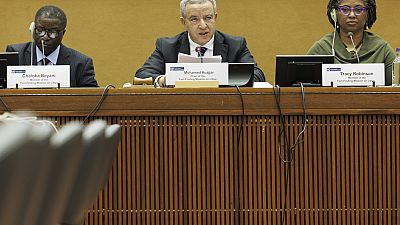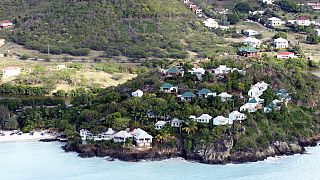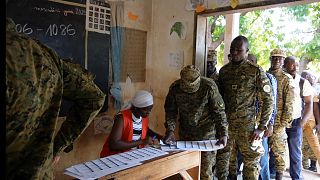Belgium
The European Union on Tuesday defended its record of helping migrants in Libya, after UN-backed investigators accused the 27-nation bloc of encouraging human rights abuses and other crimes in this North African country.
Libya is an important jumping-off point for people from North Africa and beyond who wish to make the perilous crossing of the Mediterranean Sea in poorly maintained boats, in search of a better life or a refuge in Europe.
According to the United Nations' International Organization for Migration (IOM), at least 529 migrants died and 848 others went missing off the coast of Libya last year. More than 24,680 people were intercepted by the Libyan Coast Guard as they attempted to leave the country and then brought back.
Presenting the report of a UN fact-finding mission to Libya on Monday, Investigator Chaloka Beyani said EU assistance to the Libyan authorities, the migration department and the coast guard "helped and encouraged the commission of these crimes", including crimes against humanity.
The report states that the migrants, some of whom could have been granted asylum, "were apprehended, detained and disembarked in Libya with the sole aim of preventing their entry into Europe, as a corollary of the European policy on immigration and the economic agenda of migration in Libya, through their subsequent detention and exploitation".
The European Commission, the EU's executive body, said it took the allegations "very seriously" while stressing that its work in Libya was essential and often carried out in coordination with UN agencies such as the IOM and the United Nations High Commissioner for Refugees.
"Doing nothing is not an answer. Our goal, our common goal, is to help improve the situation of people stranded in Libya," said Commission spokesman Peter Stano.
"Of course there are incidents. There are issues that are a source of concern. We are trying to resolve them with the partners in Libya, with the international partners," Stano told reporters in Brussels. He added that the EU mission in Libya had cooperated with the investigators.
The report also states that investigators believe that the EU and its member countries "provided, directly or indirectly, financial and technical support as well as equipment, such as boats, to the Libyan Coast Guard and the Directorate of fight against illegal migration", which have been used to intercept and detain migrants.
However, Mr Stano refuted suggestions that the EU could pay to keep migrants in Libya.
"We don't fund any Libyan entity. We don't give physical money to our partners in Libya," he said. "What we do is allocate a lot of money, which is then generally used by our international partners. A lot of it goes through the United Nations, for example".
Earlier this month, the Commission said a new boat had recently been handed over to the Coast Guard. Two more new boats and an undisclosed number of refurbished boats are yet to come.
At the same time, the EU refurbished six other boats for the Libyan General Administration of Coastal Security, which is separate from the Coast Guard. In February, Italy provided two more fast craft to the GACS fleet. The Commission said on Tuesday that 142 officers from the General Administration for Coastal Security had received EU training.
Italy, where most of those leaving Libya to arrive, has received at least 15 million euros ($16.3 million) from the EU to fund migration and border control work there.
Last year, in a written response to a question from the European Parliament, EU Home Affairs Commissioner Ylva Johansson said that "the EU has spent around 700 million euros ($760 million) on Libya over the 2014-20 period, including €59 million ($64 million)" for the Coast Guard and GACS.













Go to video
EU ministers warn of countermeasures to US tariffs if trade negotiations fail
01:42
Gaza conflict overshadows EU-Southern Neighbourhood talks in Brussels
01:09
Dozens of migrants held for ransom by criminal gang in Libya released from captivity
Go to video
UN Migration Chief warns against ignoring root causes of migration
Go to video
Greece cracks down on irregular migration, says it’s "not an open corridor to Europe"
Go to video
Nearly 200 migrants intercepted off the coast of Senegal